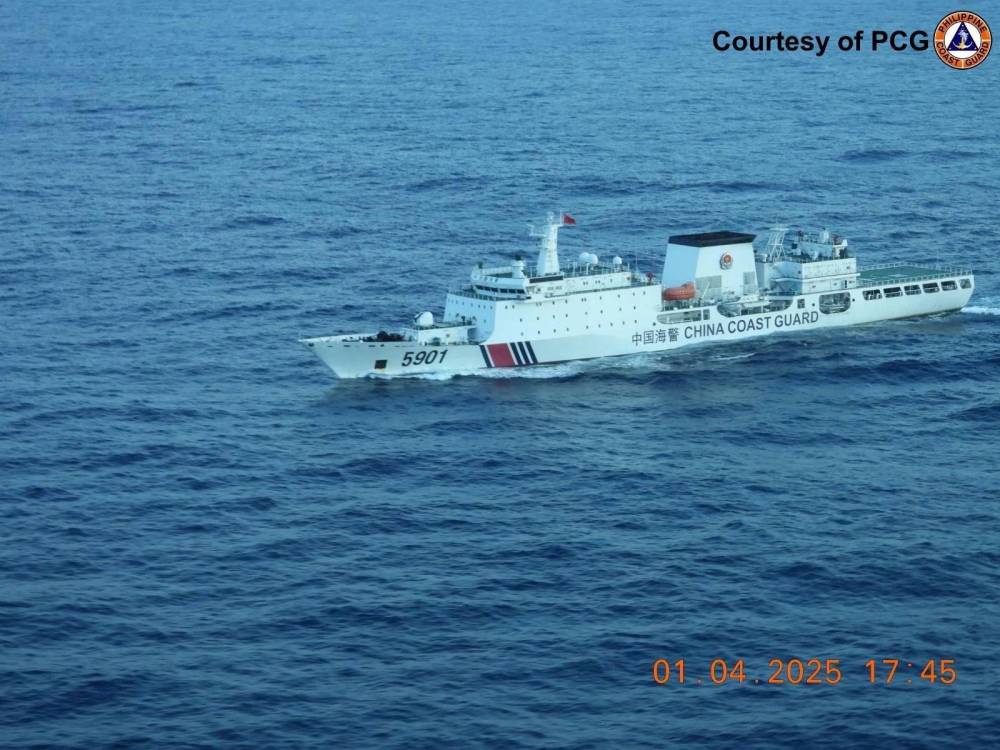PH not intimidated by ‘Monster’ presence

Philippine maritime authorities on Wednesday reiterated that they would not abide by China’s attempts to “normalize” its acts of intimidation in the West Philippine Sea by deploying “The Monster,” its biggest coast guard vessel, to the area.
“You have to look at the presence of the monster ship as a reaction to our legislated archipelagic sea-lane and maritime zones act,” Rear Adm. Roy Vincent Trinidad, the Philippine Navy spokesperson for the West Philippine Sea, told the Inquirer.
Trinidad was referring to the Philippine Maritime Zones Act and Philippine Archipelagic Sea Lanes Act, which President Marcos signed into law in November.
“We legislated. They countered. And now they are enforcing. That’s how simple it is,” Trinidad said.
On Tuesday, China’s Ministry of Foreign Affairs said that the monster ship called China Coast Guard (CCG) 5901 was simply enforcing the law since the waters belong to Beijing’s “sovereign” territory.
But Commodore Jay Tarriela, the Philippine Coast Guard spokesperson for the West Philippine Sea, said that intimidation has “consistently been part of the Chinese playbook” and has been applied to other nations as well.
Maritime security expert Ray Powell earlier reported that Beijing also used CCG 5901 in 2024 to intimidate Vietnam by intruding into Hanoi’s oil and gas fields in the South China Sea.
The year before that, CCG 5901 was sent to intimidate Indonesia by intruding into Jakarta’s exclusive economic zone in the North Natuna Sea.
“Their goal is to normalize such deployments, and if these actions go unnoticed and unchallenged, it will enable them to alter the existing status quo,” Tarriela said.
Usual playbook
“This strategy of normalization, followed by altering the status quo and ultimately operationalizing their illegal narrative, has consistently been part of the Chinese playbook,” he added.
Tarriela said the BRP Teresa Magbanua was one of the two cutters Manila sent to continuously challenge the presence of CCG 5901 off the coast of Zambales.
But maritime authorities stressed that they still consider such intrusions as threats to the country’s sovereignty, even if it is just a submersible drone, like the one fishermen found in Masbate in December.
“Regardless of whether it is a commercial or military specification, we will always treat it as a threat to our sovereignty,” Defense Undersecretary Ignacio Madriaga told senators on Wednesday.
Security officials believe the drone was Chinese, but no nation has claimed the equipment.
Foreign Undersecretary Eduardo de Vega said the Department of Foreign Affairs has not made any inquiry with other countries as to the ownership of the drone.
“We did not send out a note to ask, ‘Is this yours?’ But we have not received any information, as expected, from any foreign state to claim ownership of the drone,” he said.
Asked if the government would allow China to conduct marine scientific research in its territorial waters should it ask, De Vega responded: “Very doubtful given that we have issues with them. If China requests, I would not say no. But it’s extremely doubtful,” he said. —WITH A REPORT FROM JACOB LAZARO

















